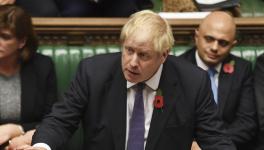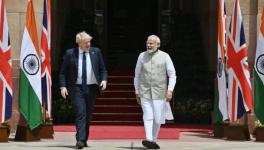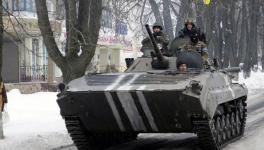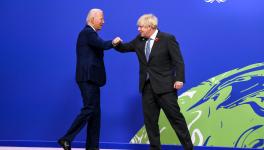Post-Brexit Trade Deal: Northern Ireland Sees Violence, Rioting Four Days in a Row
Image Source: WIVB
London: Rioters set a hijacked bus on fire and hurled gasoline bombs at police in Belfast in the fourth night of violence in a week in Northern Ireland, where Brexit has unsettled an uneasy political balance.
Youths threw projectiles and petrol bombs at police on Wednesday night in the Protestant Shankill Road area, while rioters hurled objects in both directions over the concrete “peace wall” separating the Shankill Road from a neighbouring Irish nationalist area.
UK Prime Minister Boris Johnson condemned the unrest, and Northern Ireland's Belfast-based government was holding an emergency meeting Thursday on the riots.
Johnson appealed for calm, saying “the way to resolve differences is through dialogue, not violence or criminality.” Northern Ireland First Minister Arlene Foster, of the pro-British Democratic Unionist Party, and Deputy First Minister Michelle O'Neill of Irish nationalists Sinn Fein both condemned the disorder and attacks on police.
The recent violence, largely in pro-British loyalist areas, has flared amid rising tensions over post-Brexit trade rules for Northern Ireland and worsening relations between the parties in the Protestant-Catholic power-sharing Belfast government.
The latest disturbances followed unrest over the Easter long weekend in unionist areas in and around Belfast and Londonderry, also known as Derry, that saw cars set on fire and projectiles and gasoline bombs hurled at police officers.
Authorities have accused outlawed paramilitary groups of inciting young people to cause mayhem.
Britain's economic split from the European Union at the end of 2020 has disturbed the political balance in Northern Ireland, a part of the UK where some people identify as British and some as Irish.
A new UK-EU trade deal has imposed customs and border checks on some goods moving between Northern Ireland and the rest of the UK. The arrangement was designed to avoid checks between Northern Ireland and Ireland, an EU member, because an open Irish border has helped underpin the peace process built on the 1998 Good Friday accord.
The accord ended decades of violence involving Irish republicans, British loyalists and UK armed forces in which more than 3,000 people died. But unionists say the new checks amount to a new border in the Irish Sea between Northern Ireland and the rest of the UK.
Unionists are also angry at a police decision not to prosecute Sinn Fein politicians who attended the funeral of a former Irish Republican Army commander in June. The funeral of Bobby Storey drew a large crowd, despite coronavirus rules barring mass gatherings.
The main unionist parties have demanded the resignation of Northern Ireland's police chief over the controversy, claiming he has lost the confidence of their community.
Get the latest reports & analysis with people's perspective on Protests, movements & deep analytical videos, discussions of the current affairs in your Telegram app. Subscribe to NewsClick's Telegram channel & get Real-Time updates on stories, as they get published on our website.























